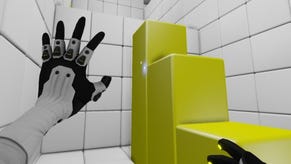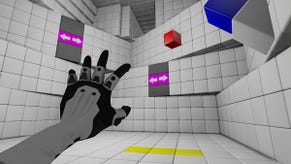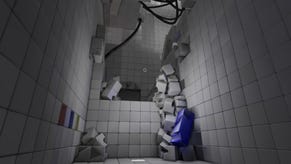Inside Q.U.B.E.: Toxic Games Interview
This First-Person Puzzlement
Toxic Games are getting ready to show the world what they've been working on, as they prepare to let the public get their hands on the latest build of Q.U.B.E. at PAX next week. I caught up with Technical Director, Dave Hall, to see how the development is going, and get a better idea of what to expect.
RPS: How did Toxic games come into being?
Hall: The team met at Newport University and Q.U.B.E. was our final project. After we finished uni we had a lot of good feedback , so we wanted to take it further. So set up our own company in order to do this
RPS: Has your process changed in the shift from student to profesional development?
Hall: The scope of the project has changed, there is a lot more to think about with a comercial game because it has to be made to a much higher standard so there is a lot more work to do. When we were at uni we were in a team of three people. We worked 15 to 20 hours a week for six weeks and that was enough to have a finished game. Since we finished uni we have been working 40 hours a week for eight months and there is still a lot of work that needs left. We also have a larger team, although the core team reamins the same three members, we outsource a lot of work to other people.
RPS: Why a first person puzzler? Why make everything out of cubes?
Hall: We wanted to keep things simple so that it was a much more feasible project. Making the entire world out of cubes meant that we had to spend very little time modelling assets, so from the start we were able to focus on the mechanics. The puzzle solving element comes from the different coloured blocks. We decided that it would be a good idea to have a variety of different coloured blocks that each behave differently so that we could have a good variety of puzzles in the game. The game starts of really simple , but as you progress each stage gets more complex.
RPS: Q.U.B.E. is being backed by the indie fund, which seems like a pretty sweet deal for startups. How important has this been for you guys?
Hall: Indie Fund have been a huge help for us. When we left Uni we wanted to take things further, but we were unsure how to do this. We considered getting a publisher deal, but we didn't know if any publisher would take us seriously seeing as we had no industry experience, and if we had a publisher it is likely that they would also own the IP. With Indie fund they understand that we don't have much experience, but they were willing to back us based on the potential of the game. The seven members of Indie Fund are all very experienced in the games industry so they can give us great advice on anything related to the game. However we still have complete complete creative control and we own the IP.
RPS: How are you going about ensuring your puzzles get the difficulty balance right?
Hall: We always try to make the objective clear and make sure the player understands how each object functions. Each mechanic is introduced in isolation so the player can learn how each cube functions without having everything explained to them. As the game progresses new mechanics are introduced. With each new mechanic the puzzles become more complex ,but they are all based around the same rule set.
RPS: Have you got any story telling ambitions, or is it just cubes and puzzles?
Hall: There is a bit of back story but it is not the focus of the game. We do not feel a full story line would have added much to the experience. We wanted the player to feel that they are part of the environment and that they also have control of the environment. As the game progresses, the environment changes, which allows for different puzzle types and makes for a more compelling experience.
RPS: After Portal, it seemed inevitable that we'd see an avalanche of first person puzzlers, but that hasn't really happened. Is there anything about the genre that you think is particularly daunting for developers?
Hall: I think the most difficult thing is having the idea in the first place and also having confidence in that idea. A lot major companies tend to play it safe by developing games that people are already familiar because they know it will sell and they see new ideas as a risk. As I said before Q.U.B.E. started as a student project which gave us time to play about with a lot of different ideas and develop our own unique game with out the pressure of having to make x amount of money.
RPS: How did you decide upon using UDK?
Hall: When we first started this project we thought about using the source engine or the unreal 3 engine, then Epic released UDK as a free download and we thought it was well suited to our idea. We were able to prototype new ideas without any programming knowledge, using the visual scripting system Kismet. Which I found quite intuitive to use.
RPS: And you still don't have any programmers on staff?
Hall: We are working With James Tan who was a programmer on The Ball. He is helping us with the menu and save system, he has also helped us with getting the gloves working in engine. Everything else in the game is scripted in Kismet.
RPS: When can gamers expect to get their hands on Q.U.B.E.?
Hall: No official release Date yet, but hopefully by the end of the year.
RPS: Thanks for your time.
Here's the latest footage:








